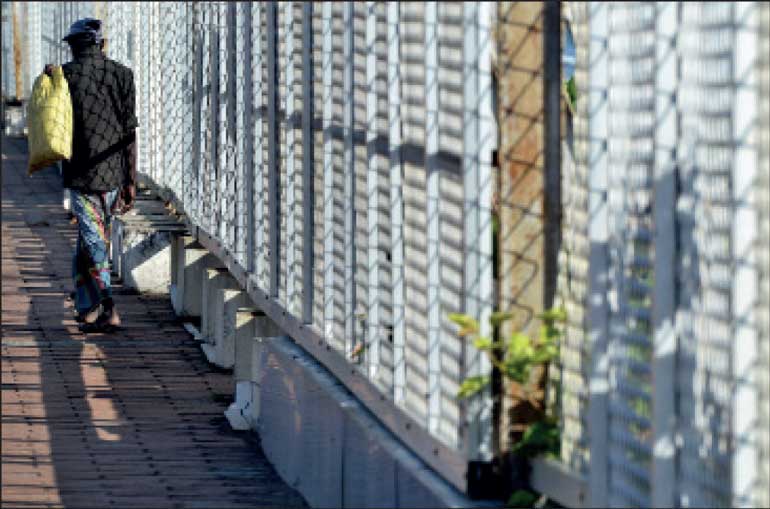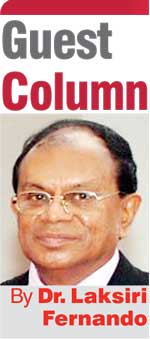Monday Feb 16, 2026
Monday Feb 16, 2026
Saturday, 6 November 2021 00:00 - - {{hitsCtrl.values.hits}}

If one draws a balance sheet, a credit can be given to COVID vaccinations, but almost all others are utter failures. At the Presidential Elections in November 2019, 6.9 million people voted with much hope, but all these are now shattered. The slogans were ‘Prosperity and Splendour’. Prosperity has been acquired by the deal makers and fraudsters; no splendour to the country or the people. The Government has zigzagged in economic policies, between ‘State-control’ and ‘free-market’ and the economy and the people have been the sufferers – Pic by Shehan Gunasekara
 This is not a prediction, but the reality. Sri Lanka is already in a serious crisis in people’s living conditions, in the economy, foreign reserves, political system, Government’s legitimacy, public administration, foreign relations, and Government’s day-to-day decision-making processes.
This is not a prediction, but the reality. Sri Lanka is already in a serious crisis in people’s living conditions, in the economy, foreign reserves, political system, Government’s legitimacy, public administration, foreign relations, and Government’s day-to-day decision-making processes.
While some are longstanding, like the foreign reserves/debt, most of the others are absolutely recent, and are the results of unequivocal incompetence and bad management. Even foreign debt has aggravated under the present administration.
If one draws a balance sheet, a credit can be given to COVID vaccinations, but almost all others are utter failures. At the Presidential Elections in November 2019, 6.9 million people voted with much hope, but all these are now shattered. The slogans were ‘Prosperity and Splendour’. Prosperity has been acquired by the deal makers and fraudsters; no splendour to the country or the people. The Government has zigzagged in economic policies, between ‘State-control’ and ‘free-market’ and the economy and the people have been the sufferers.
Economy and inflation
What affects the people in general and their living conditions at present is the thumping inflation in essential commodities. Even according to the Central Bank, the national inflation rate has gone up from 3.7% in January 2021 to 7.6% in October 2021.
As the Trading Economics website has noted, “Prices advanced at a faster pace for both food products (12.8% vs. 10% in September) and non-food products (5.4% vs. 3.8%).” Taking into account the piling up of hardships on people, Moody’s has downgraded Sri Lanka’s sovereign rating from Caa1 to Caa2. Corruption might be another reason for this downgrading.
People’s living difficulties cannot be fully gauged through the official inflation rates. The newspapers and TV interviews with people on the ground have revealed more drastic conditions. Day by day the prices of essentials like rice, tea, milk powder, sugar, bread, coconut, lentils and vegetables have been going up. Men express their anger and women cry referring to their children’s and household needs. One reason for the price inflation is the rapid increase of fuel prices. Undoubtedly the world prices are going up, but in Sri Lanka, the gap between the fuel refinery costs and market prices is also high.
Of course many countries have suffered economically during the COVID pandemic. But to alleviate people’s suffering during the lockdowns and after, most countries (if democratic!), have taken measures to supply various payments and relief measures. It is understandable that Sri Lanka has serious public finance difficulties. However, most of these difficulties are due to waste, corruption, and financial mismanagement. The stagnation of salaries in both the public sector and the private sector has also contributed largely to the people’s difficulties.
Zigzag policies
There have been this zigzag policies and U-turns particularly between August and October this year. First the Government imposed a state of emergency on essential food items, including rice and sugar, with controlled prices and started to raid the hoarders. Then it created a huge black market and the prices shot up. The Government did not have any control. Then the Government withdrew all the gazette notifications on controlled food prices, and the prices again went up!
Even before, since March 2020, import controls were imposed due to foreign currency shortages. Since then and until last month the Government was going in a ‘closed economy’ direction. After one year’s ‘experimentation,’ in April this year, Basil Rajapaksa was sworn in as the Minister of Finance to implement a change. It is that change that we are experiencing now! In September this year, Ajith Nivard Cabraal also was appointed as the Governor of the Central Bank changing the previous policies.
Now it appears that we are in an ‘open economy,’ more open than before to corruption and ‘money making’ by politicians, their families and cohorts. This is part of the controversy over the discreet deal between the Government and the American New Fortress company.
The old dichotomic controversy between a ‘closed-economy’ and an ‘open-economy’ does not have much meaning today. While an economy should be open as much as possible in market sense and also in investments, the State has a definitive role in holding strategic enterprises like harbours, airports, and the energy sectors. In addition, the State also should offer welfare services to the needy, and encourage people to work hard and contribute to the country’s welfare. To motivate people for work and entrepreneurship, the politicians should exemplary, and free from corruption and misdeeds.
Fertiliser crisis
It was in April this year that the President suddenly declared a complete banning of chemical fertiliser importation. It was like a military order. That was the wrong. There is no question that properly-composed organic fertiliser is better for the environment and people’s health. However, that transition requires much time, planning, education to the farmers, and necessary arrangements to produce (or import) reliable organic fertiliser.
The immediate effect was on the tea industry and vegetable cultivation. Then came the Maha paddy cultivation season in September. Without fertiliser, chemical or organic, farmers could not get into the fields. Except in certain areas, the situation is the same today. Although the agriculture contribution to GDP is (under) estimated to be 8%, over 28% of the population depend on agriculture and 82% of the population lives in rural areas.
In President’s speech in April, he said, “The annual sum of $ 400 million spent on fertiliser imports could be used to uplift the lives of the people.” Now what has happened? Perhaps realising the failure to suddenly produce organic fertiliser locally, the Government then decided to import 99,000-tons of ‘organic’ fertiliser (solid and liquid) from China. Perhaps there were other reasons.
This fertiliser has proved or alleged to be more harmful than the chemical fertiliser! The Government also decided to import 30,000 tons of potassium chloride from Lithuania suddenly, but called it ‘organic fertiliser’. Sri Lanka also had to so far import 3.1 million litres of nano liquid fertiliser from India. All these new foreign contracts may have had some commissions to some politicians.
Within the last three months, fertiliser costs have rocketed to nearly $ 150 million and if calculated with previous imports (Jan-July), definitely exceeding the previous annual cost of fertiliser imports ($ 400 m) that the President quoted in April. If these figures are incorrect, it is up to the Government to reveal the correct figures to the people.
Elevation of Gnanasara?
The Government’s mistakes, blunders or offenses do not limit to mismanagement of the economy, cost of living, or the ‘commission seeking’ deals by the ministers and the appointed officials. The social and public policies are equally disastrous. A recent case in point is the appointment of (Ven.) Galagoda Aththe Gnanasara as the Chairman of the so-called Presidential Task Force on ‘One Country, One Law’.
‘One country, one law’ is not the correct formulation, if it refers to bringing the civil codes or personal laws in the country to some uniformity or conformity. ‘Uniform civil code’ or ‘common civil code’ might be better formulations.
‘One country, one law’ should refer strictly to bringing the validity and application of laws equally to the ‘powerful and the powerless’; the ‘politicians and the ordinary citizens’; and to ‘the rich and the poor,’ etc. This is the way the majority of the people must have understood the slogan at the last elections.
Gnanasara undoubtedly is not suitable to either of the tasks. He is appallingly partial, aggressive and a violent man. He is the leader of the Bodu Bala Sena (Buddhist Power Army) with proven discordant behaviour. He has been involved in many violent acts and was in jail for six months for threatening a woman in court. What kind of law reforms one can expect from this type of a person? In addition to this dubious Chairman, this so-called 13 member Task Force do not have a single woman, a Tamil or a Christian.
Conclusion
There is extreme danger that the purpose of the above moves, on the part of the Government, would be to instigate and fuel religious and ethnic tensions in the country. This is in order to possibly tighten a stronger military/authoritarian grip on the political system as the economic and political policies of the Government have utterly failed. Galagoda Aththe Gnanasara has close affinity and relations with Myanmar’s extremist monk, Ashin Wirathu, who was a strong supporter of the military coup in Myanmar.
However in Sri Lanka, the democratic traditions of the country, the people’s awareness, the trade union movement, the independent media, the civil society organisations are stronger than the spoiled and corrupt political leaders. There are some good people both in the Government and in the Opposition. It is also unlikely that even the military in general could be bent totally on to the ‘whims and fancies’ of the political leaders. Let us keep our fingers crossed.